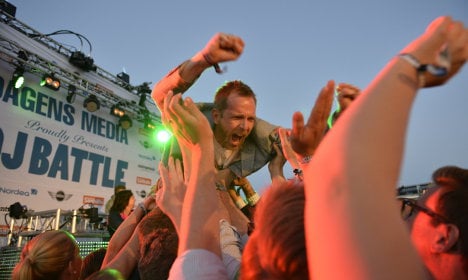1. They're both staged on islands
Key to the Survivor concept is marooning an unlikely bunch of competitors on an isolated island, and Almedalen Week, held in early July, also hinges upon thrusting a group of rivals onto a tiny location. The event effectively crams Sweden's political and business elite together on a small corner of the island of Gotland, while journalists, members of the public, charities and pressure groups are also given access.
For eight days, a variety of different people from a variety of different backgrounds rub shoulders on the streets of the medieval walled city of Visby, and the small size of the place means it won't be particularly easy to escape anyone you don't see eye to eye with. But then, that's part of the point, as The Local's James Savage once explained here.

Prime Minister Stefan Löfven giving a speech at Almedalen 2016. Photo: Henrik Montgomery/TT
2. They've both been going on for decades
Almedalen Week dates all the way back to 1968, when the Swedish prime minister at the time, Olof Palme, made a speech from the back of a truck at Visby. He was followed that same year by Krister Wickman, another political heavyweight of the era and a regular summer visitor to Gotland. From there, the event gradually grew, snowballing over the decades until it became the huge occasion it is today.
Survivor doesn't quite stretch back as far as the 1960s, but its origins do date to almost two decades ago when Swedish reality show Expedition Robinson first aired in 1997. The format was subsequently exported to America, with the US version premiering in 2000. It still runs to this day, so there's clearly something about those islands…

Olof Palme a few years later, speaking in Almedalen park in 1981. Photo: Andi Loor/SvD/TT
3. They're both huge media events
Incredibly for a programme that has been running since 2000, in the US, Survivor still consistantly ranks among the 30 most-watched shows in the country. The brief moment in the spotlight it provides is a golden opportunity for competitors to try to carve out a career as minor celebrities, lest they return to their day jobs when the series is over.
Almedalen Week, likewise, is a huge media affair in Sweden, and with the eyes of the country fixed firmly on Gotland, there have been a few extreme examples of attempted attention-grabbing over the years. Like when Feminist Initiative party representative Gudrun Schyman burned 100,000 kronor on a barbecue in 2010 in protest over the gender pay gap. Or when former Green Party member Jenny Wenhammar launched a topless protest during the prime minister’s key speech in 2014.

A big screen showing Left Party leader Jonas Sjöstedt during Almedalen Week. Photo: Henrik Montgomery/TT
4. They're both about winning votes
Survivor is all about making sure you are voted the “sole survivor” and claim the show's grand prize, and attracting votes is also a big part of Almedalen Week. On Gotland, each political party uses their designated day to hold interviews, host seminars, and deliver key speeches, all of which can be useful in winning over voters. Unlike Survivor, there's no tangible cash prize on offer, but proving your worth as a political force can be important in the long run.

Liberal Party leader Jan Björklund being interviewed during Almedalen Week. Photo: Janerik Henriksson/TT
5. They both stage challenges
Survivor uses gruelling physical challenges to pit entrants against each other for rewards, and while drinking rosé wine is about as physically challenging as it gets at Almedalen, the week does boast a notable trial.
Every year, a DJ battle is staged between the parties in government and the opposition, with the victors claiming both bragging rights and a shiny trophy. In 2016 the government came out on top thanks to their choice of Swedish pop staples from the likes of Håkan Hellström and Veronica Maggio. The opposition Alliance's trump card of Spice Girls favourite Wannabe apparently wasn't enough. Only in Sweden.
Only in Sweden would you have a dance-off on the beach featuring news anchors and government… https://t.co/okfkJTRt6j
— Max Foster (@MaxFosterCNN) July 7, 2016

Culture minister Alice Bah Kuhnke and EU minister Ann Linde at last year's DJ battle. Photo: Henrik Montgomery/TT
Article first published in 2016 and updated in 2017.




 Please whitelist us to continue reading.
Please whitelist us to continue reading.